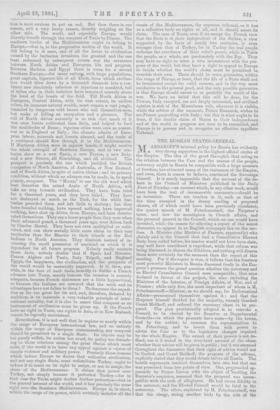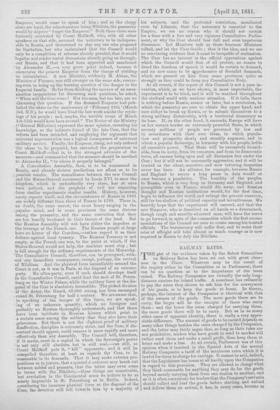THE RUSSIAN STATES-GENERAL.
MABSAKOFF'S internal policy for Russia has evidently • very strong supporters in the highest official circles of the Empire. The idea of the great Slavophil, that owing to the relation between the Czar and the masses of the people, autocracy might in Russia be compatible with a large measure of freedom, has attracted many of the statesmen of the Empire, and even, there is reason to believe, convinced the Sovereign himself. It is nearly impossible that the account of the de- bate in the Council of Ministers published in the Daily News of Tuesday—an account which, in any other week, would have been the text of innumerable comments—should be an invention. There are touches in it, such as that of the time occupied in the dreary reading of proposed ukases, all of which could have been previously circulated,. the quaint speech of M. Pobedonostseff, the Emperor's tutor, and now his mouthpiece in Church affairs, and the personal quarrel in the Council, which no one would have invented, while the reason for allowing a report of the secret discussion to .appear in an English newspaper lies on the sur- face. A Minister (the Minister of Finance, apparently) who plainly said in the Council that had a Consultative Elected Body been called before, his master would not have been slain, may well have considered it expedient, while that reform was being discussed, to disarm the Nihilists, and nothing will disarm them more certainly for the moment than the report of this meeting. For if the report is true, it follows that the fourteen most powerful Ministers in Russia discussed freely in the Em- peror's presence the grand question whether the autocracy and an Elected Consultative Council were compatible ; that nine declared in favour of the project, the nine including the Ministers of the Interior, of Foreign Affairs, of War, and of Finance ; while only five, the most important of whom is M. Pobedonostseff—Minister, as we should say, for Ecclesiastical Affairs—pronounced themselves against it ; and that the Emperor himself decided for the majority, warmly thanked Count Melikoff, and ordered the necessary ukase to be pre- pared. The plan provisionally adopted is to convoke a Council, to be elected by the Zemstvo or Departmental Councils—in which the peasants have seats—by the towns, and by the nobles ; to summon the representatives to St. Petersburg, and to invest them with power to advise the Czar as to the legislative changes required by the whole Empire. The extent of their powers is not de- fined, nor is it stated in the over-brief account of the ukase- whether their advice will be given in public ; but it was assumed throughout the discussion that their right of advice would not be limited, and Count Melikoff, the proposer of the scheme, explicitly stated that they would debate before all Russia. The hostile arguments resolved themselves into one, but that one was presented from two points of view. One, propounded ap- parently by Prince Lieven with the object of 'exciting the Emperor's suspicion, assumed that the proposal was incom- patible with the oath of allegiance. He had sworn fidelity to the autocrat, and the Elected Council would be fatal to the autocracy. The other, explained by M. Pobedonostseff, was that the clergy, seeing another body by the side of the
Emperor, would cease to speak of him ; and as the clergy alone are loyal, the schoolmasters being Nihilists, the peasantry would by degrees" forget the Emperor." Both these views were furiously combated by Count Melikoff, who, with all other apeakers on that side, assumed the autocracy to be indispens- able to Russia, and threatened to slay any one who proposed its limitation, but who maintained that the Council would only be a completion of reforms already granted, that it would ilegalise and render useful discussions already going on through-
• out Russia, and that it had been approved and sanctioned by Alexander II.,—a very grave point indeed, because it —exonerates the present Emperor from the charge of yielding
• to intimidation. A new Minister, evidently M. Abaza, the Minister of Finance, was still stronger on the same side, ventur- ing even to bring up the burning question of the danger to the Imperial family. So far from thinking the morrow of an assas- sination inopportune for discussing such questions, he asked, "When will the time conic? Not too soon, but too late, are we discussing this question. If the deceased Emperor had pub- lished the ukase on the anniversary of February 19th '(March 3rd, N.S.), he would have lived the last week amidst the rejoic- ings of his people ; and, maybe, the terrible event of March 1st-13th would have been averted." The Nestor of the Ministry (I General Miliutine) expressed the same opinion, revealing his knowledge, as the intimate friend of the late Czar, that the reform had been intended, and employing the argument that universal representation was a logical consequence of universal .military service. Finally, the Emperor, rising, not only ordered the ukase to be prepared, but entrusted the preparation to • Count Melikoff—that is, to the strongest advocate of the measure—and commanded that the measure should be ascribed to Alexander II., "to whom it properly belonged."
A Consultative Assembly, then, is to be summoned in Russia, and already sinister predictions are afloat as to its possible results. The resemblance between the new Council and the States-General summoned by Louis XVI. to save the .,kingdom; which is undoubtedly very close, has at once been noticed, and the prophets of evil are expecting .•from similar experiments similar results. History, however, rarely repeats itself, and the circumstances of Russia in 1881 are widely different from those of France in 1789. There is,
. no doubt, the same unrest, the same heavy surging in the popular mind, and in some provinces the same distress among the peasantry, and the same conviction that they .aro too heavily burdened in their tenure of the land. But the Russian Assembly will not have either the impulses or the leverage of the French one. The Russian people at large have no horror of the Czardom,—rather regard it as their defence against local tyranny. The Russian Treasury is not empty, as the French one was, to the point at which, if the States-General would not help, the machine must stop ; but is full enough for the ordinary requirements of the Monarchy. 'The Consultative Council, therefore, can be prorogued, with- 'out any immediate consequence, except, perhaps, the revival • IA Nihilism. And the physical force immediately around the Court is not, as it was in Paris, at the disposal of an extreme party. No ultra-party, even if such should develope itself in the Consultative Council, could hurl the mob of St. Peters- iburg on the Winter Palace, while the military force at the dis- posal of the Czar is absolutely irresistible. The picked division • of the Army, the Guard, 60,000 strong, has been encamped round St. Petersburg for half a century. We are aware that, in speaking of the temper of this force, we are speak- ing of an unknown quantity, which no foreigner and probably no Russian thoroughly understands, and that there have been incidents in Russian history which point to • a certain sense among the soldiery that they also have their grievances. But there is not the slightest proof of military disaffection, discipline is extremely strict, and the Czar, if dis- content should appear, could remove it more rapidly and more • • effectively than any Assembly. The Council will, therefore, if it meets, meet in a capital in which the Sovereign's power is not only still absolute, but is still real,--can still, as ' Count Melikoff puts it, " kill " opponents ; and it will be compelled therefore, at least as regards the Czar, to be 'reasonable in its demands. That it may make extreme pro- positions as to tenure, that a quarrel a outran cc may break out between nobles and peasants, that the latter may even come to terms with the Nihilists,—these things are conceivable, but revolution in the Continental sense we believe to be as nearly impossible in St. Petersburg as in Berlin. Indeed, considering the immense physical force at the disposal of the Czar; the devotion still felt towards him by a majority of his subjects, and the profound conviction, manifested even by Liberals, that the autocracy is essential to the Empire, we see no reason why it should not coexist for a time with a free and very vigorous Consultative Parlia- ment, or why the Czar should fear full and even impetuous discussion. Let Members talk as these fourteen Ministers talked, and let the Czar decide ; that is the idea, and we see no convincing evidence that it must be incapable of realisation. The Czar has no interest in the official oppressions against which the Council would first of all protest, no reason to dread the freedom of speech it would be certain to demand, and no new cause to be apprehensive of Socialist demands, which are pressed on him from some provinces quite as strongly as they could be from any Consultative Body.
At all events, if the report of this Council is not a pure in- vention, which, as we have shown, is most improbable, the experiment is to be tried, and it will be watched throughout the civilised world with anxious attention. If it fails, there is nothing before Russia, sooner or later, but a revolution, in which the peasantry are sure to obtain the upper hand, and sure either to break up Russia, or to submit themselves to a strong military dictatorship, with a territorial democracy as its base. If, on the other hand, it succeeds, Europe will have on her eastern border an extremely powerful State, in which seventy millions of people are governed by law and in accordance with their own ideas, in which popula- tion and prosperity slowly and steadily augment, and in which a popular Sovereign, in harmony with his people, holds all executive power. That State will be excessively formid- able, from its unity, from its resources, and from its democratic force, all careers being open and all discussion free under the Czar ; but it will not be necessarily aggressive, and it will be trusted as the silent, secretive, and now tottering despotism never has been. An alliance, for example, between Russia and England to secure a long peace in Asia would at once become a possibility. The hostility of the peoples to Russia, which is very deep in Germany and England, and perceptible even in France, would die away, and Russian thought and Russian institutions would, for the first time, begin to influence the world, and enlarge the general reservoir, still far too shallow, of political capacity and inventiveness. We heartily hope that the experiment will succeed, and that the new Emperor, who is described on all hands as a determined, though rough and scantily-educated man, will have the nerve to go forward, in spite of the commotion which the first recom- mendations of the Council are sure to create among his trusted officials. The bureaucracy will suffer first, and to resist their cries of affright will take almost as much courage as is now required in Russia to defy the Nihilists.



































 Previous page
Previous page